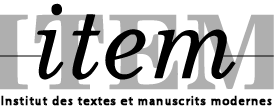25/11/2010
Preliminary programme of the 7th International Conference of the European Society for Textual Scholarship (ESTS):
—
pan style= »font-weight:bold; »>Thursday 25 November, CNR Pisa
9.15 Welcome and introduction: P. Robinson, A. Bozzi
9.30-11.00 Plenary session 1: Recent trends and theory in tool development in textual scholarship. K van Dalen (organizer), J. van Zundert, R. Dekker, P. Robinson, P. Shillingsburg
11.00 Coffee break
11.30-1.00 Parallel Sessions 1, 2 and 3
1. Editorial issues (1)
A. Miltenova: The Electronic Publication of Slavic Texts: the Case of the Open Tradition
Y. Lyutskanov: Editing in ‘Passive’ and in ‘Active’ ‘Voice
B. Dedner: Texts to be edited and texts to be scanned
2. Classical and pre-medieval
A. Berra: The Two Bodies of the Hydra: Athenaeus’s Text and its Epitome
C. Macé: Pseudo-scientific literature by pseudonymous authors: the case of Gregory Nazianzen’s Contra Astronomos
M. Buzzoni: How many Hêliand “texts” do we have, and how many are worth editing?
3. Nineteenth-century texts (1)
D. Atkinson: On Editing Broadside Ballads
M. Nixon and A. Antonielli: The Works of William Blake: Poetic, Symbolic and Critical
M. Vaicekauskas: The Lithuanian Acta Sanctorum: The Unknown Hagiography of Motiejus Valančius
1.00-2.00 Lunch
2.00-3.30 Parallel Sessions 4 and 5
4. Digital Tools and environments for editing.
P. Boot: Tools worth building: Using website metrics to measure a digital edition’s effectiveness and to profile its users
Z. Uhlir: Manuscriptorium personalized environment and problems of text editing
D. Fiormonte and D. Schmidt:What and how to edit in digital environments. An experimenting tool
5. Editing Renaisssance Texts
N. Jovanovic: The Waschzettel of Croatian Dante: Marulic’s Repertorium and marginalia
J. Nelson Novoa: Editing Leone Ebreo
P. Van Heck: The Manuscript works of Pietro Giannone
3.30-4.00 Coffee
4.00-5.30 Parallel Sessions 6 and 7
6. Editing medieval texts (1)
M. Alberni: The Last Song of the Troubadours. Editing a 15th Century Recentior (Chansonnier VeAg): Why, How, etc.
T. Andrews: ‘Devoid of literary merit’? The importance of editing the Chronicle of Matthew of Edessa
M. Peikola: Editing Wycklyffes Wycket: a medieval text in early modern guise?
7. Editing modern texts (1)
T. Jelsbak: Editing early 20th avant-gardes
A. Thacker: Voyages in the Dark: the Texts of Jean Rhys
W. van Mierlo: What Texts are too Difficult to Edit? A Case Study of Finnegans Wake
Thursday evening: meeting of the ESTS board.
—
Friday 26 November, CNR Pisa
9.30-11.00 Parallel sessions 8 and 9
8. Practice and theory in digital editing
D.O’Donnell : What comes between: editing context
M.Portela: Digital Editing for Experimental Texts
B.Nelson: The John Donne Society’s Digital Text Project: Large and Layered, Small and Simple
9. Marginal texts and collected editions.
Organizer: A. Williams, Chair J. McLaverty
L. Bree: Editing Jane Austen’s Manuscripts for a Print Edition
A. Rounce: Publishing in Two Places. Swift’s City Cries
A. Williams: When is a work not a work? Editing Swift’s Journal to Stella
11.00 Coffee break
11.30-1.00 Parallel sessions 10, 11 and 12
10. Nineteenth-century texts (2)
D. Van Hulle: A pencil sketch worth editing: the first version of the Origin of Species
B. Bordalejo: Textual variation in the print editions of the Origin of the Species
P. Subacius: Stone edition: false stability
11. Medieval Texts (2)
M Rambaran-Olm: Descending into Editing Hell: Is there Value in Editing the Exeter Book’s ‘Descent into Hell’
F. Fischer: The matter of choice under a pluralistic approach towards texts
A. Hansen: Editing popular medical texts
12. Editing modern texts (2)
Y. T’Sjoen: There are as many versions of Hugo Claus (& Co) as there are versions of his texts
J. Gielkens: ‘Should I be damned or thanked?’ Thoughts on editing Vladimir Nabokov’s The Original of Laura
M. Lana: Choosing the right newspaper article: identifying anonymous articles written by Antonio Gramsci
1.00-2.00 Lunch
2.00-3.30 Parallel Sessions 13 and 14
13. Editorial issues (2)
A-M. Ket-Vree: Polyperspectival Corpora of Letters: Opportunities and Challenges
H. Biber: Choosing Texts from a Corpus
K. Myojo: Zenshu’s Functions in Japanese Literary Studies: Practices and Problems of Modern Textual Editing in Japan
14. Editing Middle English material in Spain.
Organizer: N. Vasquez.
N. Vasquez: Sociolinguistics and the edition of medieval manuscripts
L. Esteban-Segura: The Editing of Gilbertus Anglicus’ Vernacular Tradition in English
T. Marqués-Aguado, University of Murcia: Editing the Antidotary (G.U.L. MS Hunter 513, ff.37v-96v)
3.30-4.00 Coffee break
4.00-5.30 Parallel sessions 15 and 16
15. The impact of digitization on editorial principles
L. Burnard: the need for textual principles
H. Brinkman: Mass digitization and the decision what to edit
H. Wals: Texts worth editing: some considerations from an institutional standpoint
16. Selecting Texts with Porous Boundaries.
Organizer: J. Ginther
T. O’Sullivan: Defining and Editing the Shifting Shapes of Sermons: Porous Boundaries in Manuscripts and Digital Media
A. Firey: “Agonizingly Familiar” yet Torrents of Variants: Editorial Paralysis in the Face of Medieval Canon Law.
J. Ginther: A Single Text or of a Collection of Texts? The Challenge of Defining the Content of the Super Psalterium of Robert Grosseteste.
—
5.30-6.15 ESTS Annual General Meeting (chair: D. Van Hulle, ESTS President).
—
Saturday 27 November, Società Dantesca Italiana, Florence
10.00-11.15 Plenary Session 2
Bill Coleman and Edvige Agostinelli: Boccaccio’s Teseida in Four Dimensions
Other speaker to be confirmed
11.45 to 1.00 pm Plenary Session 3
Speakers to be confirmed.
Wednesday 1 December
Associated event: The Shaw Digital Edition of the Commedia of Dante Alighieri
Sponsored by Scholarly Digital Editions (U.K.), SISMEL (Italy).
P. Shaw, L. Pertile, G. Inglese.
Time and venue to be confirmed

















